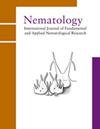南非灌木茶(Athrixia phylicoides)的植物寄生线虫及其与土壤理化性质的关系
IF 1.1
4区 生物学
Q2 ZOOLOGY
引用次数: 0
摘要
灌木茶(Athrixia phylicoides)是一种芳香的多年生多叶灌木,是南非东北部山脉的特有植物,作为含咖啡因茶叶的替代品,具有很高的商业化潜力。2018-2019 年夏季和冬季,在南非东北部地区的九个地方开展了一项调查,研究与灌木茶相关的线虫多样性,并从出现频率和丰度方面确定主要的植物寄生线虫。在 90 份根圈土壤和根部样本中,共鉴定出 21 种植物寄生线虫,分属 14 个属。Meloidogyne 和 Helicotylenchus 是主要的植物寄生线虫属。Meloidogyne javanica 和 Scutellonema brachyurus 在所有地点都有发现,其次是 M. enterolobii、Pratylenchus brachyurus、Rotylenchulus parvus、H. martini 和 S. truncatum(在 7-8 个地点发现)。发现的其他物种包括 Criconema corbetii、C. sphaerocephalus、C. xenoplax、Criconemoides ihlathum、C. parvus、Discocriconemella glabrannulata、H. dihystera、H. erythrinae、H. paraplatyurus、Hemicycliophora typica、M. hapla、M. incognita、Rotylenchulus unisexus 和 R. clavicaudatus。Crossonema、Paratylenchus、Ogma、Xiphinema americanum-组和X. americanum sensu lato的个体由于样本数量较少而无法鉴定到物种水平。对两种用于鉴定 Meloidogyne 种群的方法进行比较后发现,与分子 SCAR-PCR 技术相比,形态学鉴定(尤其是会阴图案形态学)能更全面地反映样本中的 Meloidogyne 种类。高浓度的铜、钾和 pH 值与最高的黑色线虫相对种群密度(RPD% = 线虫属的平均种群密度/线虫总种群密度 × 100)相关,而高浓度的铝和土壤电阻率与最低的黑色线虫 RPD% 相关。相比之下,高水平的钾和 pH 值与最低的 Helicotylenchus RPD% 相关,而高水平的铝和土壤电阻率与最高的 Helicotylenchus RPD% 相关。本文章由计算机程序翻译,如有差异,请以英文原文为准。
Plant-parasitic nematodes associated with bush tea (Athrixia phylicoides) in South Africa and their relationship with physico-chemical soil properties
Bush tea (Athrixia phylicoides) is an aromatic, perennial, leafy shrub that is endemic to the northeastern mountain ranges of South Africa and has a high potential for commercialisation as an alternative to caffeine-containing tea. During the summer and winter of 2018-2019, a survey was carried out at nine localities in the northeastern regions of South Africa to study the diversity of nematodes associated with bush tea and, in terms of frequency of occurrence and abundance, identify the dominant plant-parasitic nematodes. Twenty-one plant-parasitic nematode species belonging to 14 genera were identified in 90 rhizosphere soil and root samples. Meloidogyne and Helicotylenchus were the dominant plant-parasitic nematode genera. Meloidogyne javanica and Scutellonema brachyurus were found at all localities, followed by M. enterolobii, Pratylenchus brachyurus, Rotylenchulus parvus, H. martini and S. truncatum (found at 7-8 localities). Other species identified included Criconema corbetii, C. sphaerocephalus, C. xenoplax, Criconemoides ihlathum, C. parvus, Discocriconemella glabrannulata, H. dihystera, H. erythrinae, H. paraplatyurus, Hemicycliophora typica, M. hapla, M. incognita, Rotylenchulus unisexus and R. clavicaudatus. Individuals of Crossonema, Paratylenchus, Ogma, the Xiphinema americanum-group and X. americanum sensu lato could not be identified to species level due to the low number of specimens present in the samples. Comparison of the two methods used to identify the Meloidogyne populations to species level shows that morphological identification (particularly perineal pattern morphology) provided a more complete picture of the Meloidogyne species present in the samples compared with the molecular SCAR-PCR technique. High levels of Cu, K and pH were associated with the highest relative population densities (RPD% = average population density of a nematode genus/total nematode population density × 100) of Meloidogyne, whilst high levels of Al and soil resistivity were associated with the lowest RPD% of Meloidogyne. By contrast, high levels of K and pH were associated with the lowest RPD% of Helicotylenchus, whilst high levels of Al and soil resistivity were associated with the highest RPD% of Helicotylenchus.
求助全文
通过发布文献求助,成功后即可免费获取论文全文。
去求助
来源期刊

Nematology
生物-动物学
CiteScore
2.60
自引率
33.30%
发文量
67
审稿时长
3 months
期刊介绍:
Nematology is an international journal for the publication of all aspects of nematological research (with the exception of vertebrate parasitology), from molecular biology to field studies. Papers on nematode parasites of arthropods, and on soil free-living nematodes, and on interactions of these and other organisms, are particularly welcome. Research on fresh water and marine nematodes is also considered when the observations are of more general interest.
Nematology publishes full research papers, short communications, Forum articles (which permit an author to express a view on current or fundamental subjects), perspectives on nematology, and reviews of books and other media.
 求助内容:
求助内容: 应助结果提醒方式:
应助结果提醒方式:


